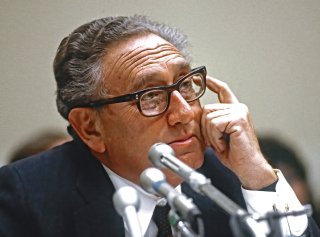Kissinger at 100: A Legacy with Lessons for Us All
How can America continue to lead the world without leaders who can combine high theory and grounded pragmatism, as Kissinger does?
On May 27, Henry Kissinger will celebrate his one-hundredth birthday and a long life of exceptional consequence in the two highly competitive worlds of diplomacy and ideas.
Fleeing Nazi Germany, Kissinger arrived in the United States in 1938 as a bookish teenager with no immediate prospects. Thirty years later, he commanded U.S. foreign policy, first as national security advisor, then as the emblematic secretary of state to two presidents, Richard M. Nixon and Gerald R. Ford. He shared the Nobel Peace Prize in 1973.
In his four years as secretary of state, he helped end America’s most controversial war, split China from Russia (the hegemonic power that propelled China’s leader to power), and redrew the boundaries of several nation-states. His books, real doorstoppers crammed with careful research and close argument, continue to climb bestseller lists and compel the attention of leaders and thinkers across the world. Decades after leaving office, he continues to be consulted by chief executives, presidential candidates, and network-television bookers.
The Center for Strategic and International Studies, chaired by another great man, a patriot and one of the most enlightened men in the American establishment, John Hamre, organized a reception in honor of Kissinger to celebrate his extraordinary accomplishments. Hamre began by reviewing history and Kissinger’s mark on it.
First, there was the Vietnam War. As the deadly presidential approached, Vietnam had settled into deadly stalemate. The year began with North’s massive Tet Offensive, which the United States desperately beat back. By September, the Viet Cong ceased to exist as a separate fighting force, but that meant no victory for the United States. The North Vietnamese Army was becoming an increasingly lethal force with its growing divisions of Soviet tanks, aircraft, and increasingly effective anti-aircraft missiles. As long as the USSR and China backed the North, the United States could never defeat it.
The stalemate was evident, and it divided America. Protests, both anti- and pro-war (the pro-soldier “hard hat revolt” in Central Park was one the largest protests in the 1960s), divided America. On television, Americans saw burning wreckage in Saigon and burning draft cards in Seattle. The public was tiring of the war.
It was Kissinger who led the peace talks. Yes, South Vietnam collapsed in 1975. But, two years earlier, the U.S. military was able to make a secure and, above all, dignified withdrawal.
It is to Kissinger that we owe the famous policy of détente with the Soviet Union. For the first time, the United States and the USSR agreed to significantly slow the nuclear arms race. As a result, several regional conflicts de-escalated. Nuclear war was avoided, and lives were spared in Southeast Asia, southern Africa, and among the Pacific islands—every place where communist guerillas fought with the local successor states to colonial powers.
To strengthen America’s position in Asia, the Nixon administration made a diplomatic rapprochement with mainland China, from which the United States had been estranged since 1949, when the Communists had won control. To seal the new relationship, Nixon took a spectacular trip to China in February 1972.
After October 6, 1973, Israeli officials telephoned Kissinger to say that they were fighting off an invasion. Egyptian forces were attacking in the Sinai while the Syrian army was in Israel’s north. The so-called fourth Arab-Israel War had begun. Nixon dispatched Kissinger to negotiate with Israel, Egypt, and Syria—Kissinger’s famous “shuttle diplomacy.”
At the end, there was a new and, this time, lasting peace. These served a few important American interests: it stopped the cycle of invasions, halted the embargo by Arab oil-exporting states, and set the stage for a historic peace treaty between Israel and Egypt (the Camp David Accords of the Carter years). Kissinger may be the only Nobel Peace Prize winner to secure more peace after winning the prize than before.
These successes make him a diplomat of historic stature. The intensity and scope of these diplomatic initiatives, and their success—in the sense that they all resulted in agreements—have no parallel in American history, and perhaps no parallel in the history of Israel. With his prodigies of diplomacy, Kissinger left his mark on the twentieth century.
While Kissinger admits that prophets have “the most passionate vision,” he said he prefers statesmen to them because they recognize on-the-ground realities and can see value in incremental gains.
Sadly, the current political climate does not encourage the emergence of leaders like Kissinger. His book devoted to “leadership” exemplified the importance of building consensus on the major issues. It is not by tweeting or posting on Facebook that a political leader can develop a vision that gives him the status of a statesman. Instead, as Kissinger writes, leaders are made by the cautious study of history.
All democracies suffer from the same ailment: An intellectually impoverished political class that is more obsessed with polls and social networks than a vision for their societies.
But this is a problem that even short-term thinkers should consider: How can America continue to lead the world without leaders who can combine high theory and grounded pragmatism, as Kissinger does?
Ahmed Charai is the Publisher of Jerusalem Strategic Tribune. He is on the board of directors of the Atlantic Council, the International Crisis Group, the Center for Strategic and International Studies, the Foreign Policy Research Institute, and the Center for the National Interest.
Image: Mark Reinstein / Shutterstock.com

